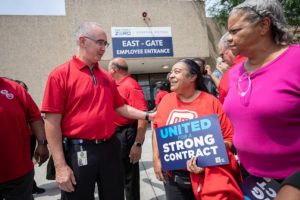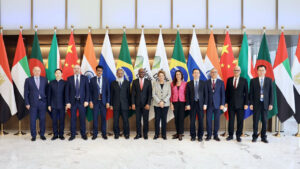Courtesy: Peoples Dispatch
The latest round of protests in Iraq entered its fifth day on Monday, October 28. This round began on October 24 when thousands of Iraqis, mostly young men and women, took to the streets of the capital city of Baghdad and other cities to demand an overhaul of the political system of the country.
Students from several schools and universities joined the protests on Monday. The demonstrators have organised a sit-in in Tahrir Square and have blocked the bridge to the Green Zone, the political center of the city. The security forces have used heavy force to disperse such blockades and prevent a section of the protesters from destroying public buildings. Some of the protesters are also demanding the resignation of the prime minister, Adel Abdul Mahdi, too. At least 74 people have died in this round of protests.
The current round of protests is a continuation of agitations in the first week of October. The protests were called over the failure of the successive Iraqi governments to tackle the issues of unemployment, poor service delivery and deep-rooted corruption. They have not subsided despite the announcement of reforms by prime minister Adel Abdul Mahdi’s government.
Prime Minister Mahdi had responded to earlier rounds of protests by announcing several policy changes and fresh initiatives, including pensions for all the families without an income, distribution of residential plots to the poor and loans to the youth. He also announced a policy of 50% reservation for the local youth in all future contracts.
Iraq’s economy is recovering from decades of sanctions and wars. Since the defeat of the Islamic State or Daesh (IS) in 2017, the country has relatively been at peace. However, the political classes in the country, most of them without any popular roots, have failed to deliver on the economic front. The second largest producer of oil among all OPEC members has around 23% of its population living below the official poverty line and the unemployment rate among the youth is more than 25%. The post-war generation, mostly the young, fail to get employment after graduating from universities.
The current government was formed last year with the support of the Sairoon Alliance or the Alliance Towards Reforms. The alliance is made of Sadarist Integrity Party and Iraqi Communist Party and is the largest block in parliament.
Most of the protesters are not convinced by promises of reform and think the only solution is a complete overhaul of the current Iraqi system. This cynicism is a result of almost two decades of external interference and inability of the political class to create a pan-Iraqi support base. The current political system was created under the US occupation of the country in 2005 without any real grassroots support.
It is no wonder that the Iraqi constitution, under which four general elections (2005, 2010, 2014 and 2018) have been held only caters to sectarian divides among the political leadership in the country and has no real agenda to create a pan-Iraqi polity acceptable to all sections of the society. This has led to complete alienation of the common masses from the electoral system. A majority of voters have remained apathetic.
The current round of protests has so far not shown any sectarian character and has been centered around the secular issues of jobs and poor service delivery and alleged corruption. The popular pressure has led the largest political block in the Iraqi Parliament to come out in support of the protests. Sairoon gave a call for an indefinite sit-in from October 26. Two members of parliament belonging to the communist party, along with two other MPs, resigned from their seats on October 27 in support of the protesters.
The internal inquiry committee, appointed after the allegations of massive repression by the security personnel during the first round of protests, has confirmed that 149 people were killed. This led the government to sack most of the officers responsible. However, the protesters have not been satisfied with the move.
(People’s Dispatch is an international media organisation whose mission is to highlight voices from people’s movements and organisations across the globe.)




